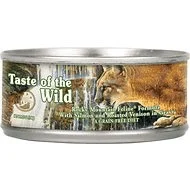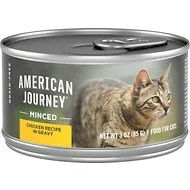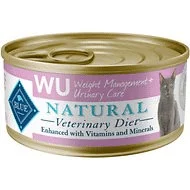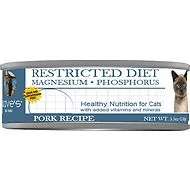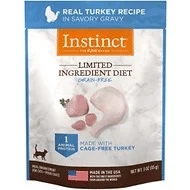10 Best Cat Foods for Urinary Tract Health in 2025
Quick Guide
- What Is The Best Urinary Cat Food?
- What Are the Most Common Urinary Tract Health Issues?
- How Does Diet Affect FLUTD and How Can You Prevent It?
- What to Look for in a Good Cat Food for Urinary Tract Health
- How Do We Make Our Recommendations?
- The 11 Best Cat Foods for Urinary Tract Health
- 6 More Top-Rated Cat Foods for Urinary Tract Health
- Blue Buffalo Natural Veterinary Diet W+U Weight Management + Urinary Care Canned Food
- Wysong Uretic with Organic Chicken Canned Cat Food
- Dave’s Pet Food Restricted Magnesium & Phosphorus Grain-Free Pork Recipe Canned Cat Food
- Lotus Turkey & Vegetable Pate Grain-Free Canned Food
- Wellness CORE Simply Shred Grain-Free Boneless Chicken Wet Cat Food Topper
- Instinct by Nature’s Variety Limited Ingredient Diet Grain-Free Real Turkey Recipe Wet Cat Food Topper
- Frequently Asked Questions
When your cat urinates outside the litter box, your first reaction is probably anger or frustration. If the issue continues to happen, you may find yourself becoming increasingly more frustrated when you SHOULD be having a completely different reaction: concern.
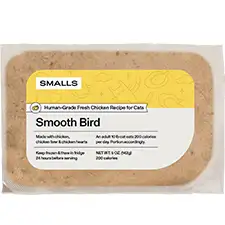
Smalls Human-Grade Ground Bird Fresh Cat Food
- Natural sources of taurine
- High in protein
Changes in behavior, especially changes that cannot easily be explained, are some of the most common indications of a health problem in cats. Pets have a natural instinct not to show pain or weakness, so you may not notice the outward signs of a health problem. Over time as the condition worsens, however, your cat may not be able to help certain changes in his behavior. At this point, you should become concerned for your cat’s health and talk to your veterinarian to see if something is going on. Changes in litter box behavior are commonly linked to urinary tract health issues.
In this article, we’ll explore the most common urinary tract health issues in cats to determine their symptoms and underlying causes. You’ll also learn how diet can impact your cat’s urinary health and receive some simple tips for preventing UTI and FLUTD in cats. Finally, you’ll see our top picks for the best food for urinary crystals and other urinary health issues.
What Is The Best Urinary Cat Food?
- Small Ground Bird Human-Grade Fresh Cat Food
- Taste of the Wild Rocky Mountain Grain-Free
- American Journey Minced Chicken Recipe
- Ziwi Peak Lamb Recipe Canned Food
- Blue Buffalo Natural Veterinary Diet
- Wysong Uretic with Organic Chicken Canned
- Dave’s Pet Food Restricted Magnesium & Phosphorus
- Lotus Turkey & Vegetable Pate Grain-Free
- Wellness CORE Simply Shred Grain-Free
- Instinct by Nature’s Variety Limited Ingredient
What Are the Most Common Urinary Tract Health Issues?
When cats stop using the litter box consistently, many pet parents blame it on poor training or old age. Unfortunately, this can lead to delayed diagnosis of a real underlying health problem. As a pet parent, it is your responsibility to care for your pet and to seek veterinary care when appropriate. As annoying as litter box issues are, if they develop suddenly you should see the problem for what it really is: a potential symptom of an underlying health problem. Any sudden change in your cat’s behavior could be a warning sign that should not be ignored.
There are a number of underlying health problems that can contribute to urinary tract issues in cats. The most common culprit is feline lower urinary tract disease (FLUD) which was once called feline urologic syndrome (FUS). FLUTD is not a disease but a combination of symptoms that could be linked to more than a single underlying cause.
Here are some of the most common symptoms of FLUTD:
- Frequent urination
- Small volume of urine
- Painful urination
- Licking of the urethral opening
- Bloody urine
- Urinating outside the litter box
Here are some of the most common causes of FLUTD in cats:
- Feline lower urinary tract disease (FLUTD)
- Bladder stones or crystals (urolithiasis)
- Urinary tract infection (UTI)
- Cystitis (urinary bladder inflammation)
- Other diseases (like diabetes or hyperthyroidism)
Urolithiasis is the clinical name for bladder stones, stones that form from urinary crystals in the bladder. There are two primary types of stone in cats – struvite stones or calcium oxalate stones. Urolithiasis is the underlying cause for about 10% to 15% of FLUTD cases. Bacterial cystitis (a bacterial infection of the bladder) accounts for 5% to 15% of cases, primarily in older cats. Though some cases of FLUTD can be identified, the majority cannot. In these cases, the underlying cause is referred to as idiopathic cystitis. This simply means that there is inflammation in the bladder with no known cause.
Now that you have a better understanding of this health problem, you may be wondering which is the best option for rodent ulcer treatment. In the next section, we’ll talk about treatment options and explore how changing your cat’s diet might help.
How Does Diet Affect FLUTD and How Can You Prevent It?
The proper treatment for feline lower urinary tract disease depends primarily on the underlying cause. With proper treatment, most cases of FLUTD resolve without recurrence or only with occasional symptoms in the future. When the underlying cause is feline idiopathic cystitis, however, your cat is more likely to develop a recurring problem.
Here are some simple things you can do to prevent FLUTD from recurring:
- Feed smaller meals on a more frequent basis
- Consider switching your cat to wet food or prescription food
- Make sure your cat has access to fresh water at all times
- Increase the number of litter boxes in your home
- Keep your litter boxes clean – scoop twice daily and replace litter weekly
- Maintain a daily routine to minimize your cat’s stress levels
In addition to these things, making changes to your cat’s diet could help treat his FLUTD and prevent symptoms from recurring. You should always feed your cat a high-quality cat food made with natural ingredients, especially real sources of animal protein. More than that, however, specific nutrients may be implicated in your cat’s risk for FLUTD.
Feeding your cat the wrong cat food can contribute to the development of feline lower urinary tract disease or increase his risk for urinary tract infections. High levels of certain minerals like calcium, magnesium, and phosphorus can increase your cat’s risk for urinary crystals which can lead to stone formation. Your cat’s food will also influence his internal pH and the acidity of his urine. For urinary tract health, your cat’s urine should be moderately acidic because it reduces the likelihood that struvite crystals will be able to form (they don’t grow well in an acidic environment).
On top of changing your cat’s diet to prevent urinary crystals and other urinary tract issues, you should make sure he is properly hydrated and help him maintain a healthy body weight. When your cat doesn’t drink enough water, his urine will be more concentrated and that increases the risk of stone formation. Obesity also increases your cat’s risk for urinary tract health issues.
What to Look for in a Good Cat Food for Urinary Tract Health
You may not think that your cat’s diet matters much when, in fact, it is a key factor for his health. What your cat eats is directly linked to his short-term and long-term health. The higher the quality of his diet, the better his digestion and immunity will be which also means that he’ll be healthier over the long haul. If your cat has urinary issues, making healthy changes to his diet could help with those as well.
Here are some of the things we look for in a good cat food for urinary health:
- High-quality, natural ingredients. The quality of your cat’s diet matters greatly and wholesome, natural ingredients are higher in nutritional value and easier for your cat to digest. Low-quality cat food loaded with fillers and grains (like corn, wheat, and soy) should be avoided for your cat’s urinary health.
- High moisture content. The average dry food contains 10% moisture while wet food contains anywhere from 78% to 82%. Moisture is key for preventing kidney and urinary health tract issues, so consider feeding your cat canned food or nutritionally balanced homemade cat food for urinary health problems.
- Look for acidifying ingredients. Struvite crystals are less likely to form in an acidic environment, so increasing the acidity of your cat’s urine may help prevent urinary health problems. Animal proteins are more acidic than plant-based ingredients and DL-methionine is an essential amino acid that helps acidify urinary pH.
- Complete and balanced nutrition. Your cat requires a certain blend of nutrients for optimal healthy, so double-check that anything you feed him is complete and balanced according to AAFCO standards. Foods made with whole food ingredients are usually more nutritious and less likely to be too high in minerals like phosphorus which can lead to urinary health problems.
It is important to remember that diet is not the only cause of urinary health problems in cats and therefore it is not the only treatment. Urinary issues in cats can be caused by numerous things, so you’ll need to talk to your veterinarian to determine the underlying cause and the best course of treatment.
How Do We Make Our Recommendations?
Proper nutrition is essential for your cat’s health, including his urinary health. If you want to keep your cat healthy and happy, you need to feed him the highest quality cat food you can consistently afford. If he has urinary tract issues, your job gets even harder. Fortunately, we’ve compiled a detailed urinary cat food comparison to help you start your search. But don’t just take our word for it with these cat foods – know that we’ve done the research and we wouldn’t recommend anything we wouldn’t be happy to feed our own cats. If it’s good enough for our cats, it’s good enough for yours!
Here are some of the requirements for a cat food to receive our recommendation:
- A source of high-quality animal protein as the first ingredient
- At least 30% crude protein for kittens and at least 26% for adults
- A minimum of 9% crude fat for kittens and adults
- A balance of omega-3 and omega-6 fatty acids, primarily from animal sources
- A rich blend of nutrients from natural sources and supplements, as needed
- Limited carbohydrate content from digestible sources (like whole grains and veggies)
- No low-quality fillers, by-products, or artificial additives (preservatives, dyes, or flavors)
All of our cat food recommendations are made based, first and foremost, on AAFCO food nutrient profiles. These profiles simply outline the minimum nutritional needs of cats in various life stages (kitten or adult). In order to determine whether a cat food meets these requirements, just look for an AAFCO statement of nutritional adequacy on the package. It should look something like this: [X Product] is formulated to meet the nutritional levels established by the AAFCO Cat Food Nutrient Profiles for all life stages. After you have successfully determined that the formula is complete and balanced, you can go on to evaluating its quality.
The 11 Best Cat Foods for Urinary Tract Health
By now you should have a better understanding of your cat’s urinary health and how his diet is related. If you still find yourself asking what is the best food for urinary tract problems, you’re in luck! We’ve done the research and read the reviews to bring you this urinary cat food comparison. Here are our top picks for the best urinary health cat food:
| Our 2025 Picks: Best Cat Foods for Urinary Tract Health | |||
Small Ground Bird Human-Grade Fresh Cat Food
|
CHECK PRICE | ||
Taste Of The Wild Rocky Mountain Grain-Free
|
CHECK PRICE | ||
American Journey Minced Chicken Recipe In Gravy
|
CHECK PRICE | ||
Ziwi Peak Lamb Recipe Canned Food
|
CHECK PRICE | ||
Blue Buffalo Natural Veterinary Diet
|
CHECK PRICE | ||
Wysong Uretic with Organic Chicken
|
CHECK PRICE | ||
Dave’s Pet Food Restricted Magnesium & Phosphorus
|
CHECK PRICE | ||
Lotus Turkey & Vegetable Pate Grain-Free
|
CHECK PRICE | ||
Wellness CORE Simply Shred Grain-Free
|
CHECK PRICE | ||
Instinct by Nature’s Variety Limited Ingredient
|
CHECK PRICE | ||
Small Ground Bird Human-Grade Fresh Cat Food
Overall Best Cat Food for Urinary Tract Health: If your cat suffers from severe urinary health problems and you feel like you can’t find the right commercial diet, you may be considering a switch to homemade cat food for urinary problems. Before you do, consider Smalls. This is fresh pet food customized to your cat’s nutritional needs and delivered right to your door. Smalls is made from fresh, wholesome ingredients and prepared in small batches to ensure nutritional quality then packaged in pre-portioned bags according to your cat’s calorie requirements. As a fresh food, it is higher in moisture than traditional cat foods and it is complete and nutritionally balanced.
- Pros: Fresh food prepared from natural ingredients, high in moisture, rich in animal protein, complete and balanced nutrition, highly digestible, customized to cat’s calorie needs
- Cons: Significantly more expensive than average food, only two recipes to choose from
Taste of the Wild Rocky Mountain Grain-Free Canned Food
Most Popular Cat Food for Urinary Tract Health: There are many different cat foods out there, so it can be difficult to choose just one for your cat – especially if there is not a specific formula your vet recommends. If you want to make a smart choice but you’re not sure where to start, consider a popular brand like Taste of the Wild. This brand uses premium-quality roasted meats in grain-free recipes that are loaded with natural flavor. This Rocky Mountain Grain-Free Canned Food is a good option for cats with urinary health issues because it contains animal protein, it is rich in moisture, and it is supplemented with DL-methionine. It contains a fairly short list of main ingredients and has a low concentration of carbohydrates but is still complete and balanced with the use of beneficial supplements like vitamins and chelated minerals.
- Pros: Rich in animal protein, high in moisture, complete and balanced nutrition, very digestible, supplemented with DL-methionine, moderate calorie and fat content
- Cons: Not specifically formulated for urinary health, contains fish ingredients
American Journey Minced Chicken Recipe in Gravy Grain-Free Canned Food
Most Affordable Cat Food for Urinary Tract Health: When shopping for urinary cat food, wet food is generally the best choice, but you don’t necessarily need to spring for prescription cat food. Urinary health problems are best treated with increased moisture intake high-quality natural ingredients, so you don’t necessarily need to spend a fortune. This American Journey Minced Chicken Recipe in Gravy is a good choice because it is very affordable, rich in animal protein, and high in moisture content. With fresh chicken as the first ingredient, this recipe contains all of the essential amino acids your cat needs, with supplemental DL-methionine for good measure. Chicken broth and turkey broth provide plenty of moisture and natural flavor while sunflower oil and fish oil provide a rich blend of omega fatty acids. It also contains cranberries for urinary health.
- Pros: Rich in animal protein, high in moisture content, highly digestible, rich blend of omega fatty acids, complete and balanced nutrition, supplemented with DL-methionine and cranberries
- Cons: Not specifically formulated for urinary health
Ziwi Peak Lamb Recipe Canned Food
Best Cat Food for Urinary Tract Health and Sensitive Stomach: If your cat has a sensitive stomach, you want to feed him something that is made with whole food ingredients. It is also a good idea to limit the number of ingredients in your cat’s food to reduce the risk of triggering a food allergy or sensitivity. We recommend this Ziwi Peak Lamb Recipe Canned Food for cats with urinary problems because it contains a single source of animal protein, it is rich in moisture, and it contains a short list of high-quality, natural ingredients. This formula features fresh lamb as the main ingredient with lamb lung, kidney, liver, tripe, and heart as supplemental sources of protein and nutrients. The only other main ingredients are chickpeas and New Zealand green mussels. You’ll also find that this recipe contains chelated minerals for nutritional balanced and it is supplemented with DL-methionine as well.
- Pros: Single source of animal protein, high in moisture content, complete and balanced nutrition, easy to digest, supplemented with DL-methionine, limited list of ingredients
- Cons: Fairly high in calories (refer to feeding instructions), may be too high in fiber for some cats
6 More Top-Rated Cat Foods for Urinary Tract Health
Finding the perfect cat food for your cat’s urinary health may not be easy. Not every case of urinary problems is the same, so the same diet may not work for all cats. If you’re looking for more options, here are a few other recipes we recommend:
Blue Buffalo Natural Veterinary Diet W+U Weight Management + Urinary Care Canned Food
When it comes to treating urinary issues, many veterinarians recommend prescription cat food. Urinary problems are frequently linked to pH, and sometimes prescription diets are the best way to modify your cat’s pH to reduce the risk for urinary crystals that can aggregate into bladder stones. This Blue Buffalo Natural Veterinary Diet W+U is the only prescription cat food we can heartily recommend because it doesn’t contain grains, fillers, by-products, or artificial additives. Fresh chicken is the main ingredient in this diet and it is supplemented by chicken liver and whitefish. This formula also contains cranberries for urinary health, higher levels of moisture, and supplemental DL-methionine.
Wysong Uretic with Organic Chicken Canned Cat Food
Though it is not a prescription diet, this Wysong Uretic with Organic Chicken Canned Cat Food is formulated specifically to address urinary health problems in cats. This recipe is designed by a licensed veterinarian and contains high levels of protein, low levels of carbohydrates, and is fortified with micronutrients and nutraceuticals to support urinary tract health. You’ll find that this recipe contains a variety of healthy ingredients starting with organic chicken and brown rice, followed by blueberries, DL-methionine, and cranberry extract.
Dave’s Pet Food Restricted Magnesium & Phosphorus Grain-Free Pork Recipe Canned Cat Food
Another recipe specifically formulated for urinary health problems, this Dave’s Pet Food Restricted Magnesium & Phosphorus Grain-Free Pork Recipe contains controlled levels of magnesium, calcium, and phosphorus to reduce bladder inflammation and the risk for bladder stones. This recipe contains fresh pork and natural pork broth as key ingredients with other natural, whole-food ingredients like potatoes, salmon oil, carrots, and parsley. Overall, it is complete and balanced for cats in all life stages and contains a rich blend of nutrients with plenty of moisture.
Lotus Turkey & Vegetable Pate Grain-Free Canned Food
Though it isn’t formulated specifically for urinary issues, this Lotus Turkey & Vegetable Pate Grain-Free Canned Food could be a good option for your cat because it is made with high-quality animal proteins and plenty of moisture. Turkey broth and fresh turkey are the top two ingredients, supplemented by additional proteins including turkey liver, ocean fish, and chicken liver. This recipe contains fresh fruits and vegetables as natural sources for key nutrients, including cranberries for urinary tract health. Another feature that makes this recipe a good option is the fact that the calcium, phosphorus, and magnesium content is listed on the can. If your veterinarian has prescribed specific levels for your cat, you’ll find it easy to determine whether this food is an option.
Wellness CORE Simply Shred Grain-Free Boneless Chicken Wet Cat Food Topper
If you’re simply trying to increase the moisture content of your cat’s food, you might consider something like this Wellness CORE Simply Shred Grain-Free Boneless Chicken Wet Cat Food Topper. This food topper contains just three ingredients: chicken, chicken broth, and water. It is not a complete and balanced recipe, so it can only be used as a food topper, but it will increase the moisture and protein content of whatever cat food you are currently feeding your cat. Simply tear open the pouch and pour it over your cat’s food then watch him enjoy it!
Instinct by Nature’s Variety Limited Ingredient Diet Grain-Free Real Turkey Recipe Wet Cat Food Topper
Another great option in wet cat food toppers is this Instinct by Nature’s Variety Limited Ingredient Diet Grain-Free Real Turkey Recipe Wet Cat Food Topper. It features a limited number of main ingredients including turkey broth, fresh turkey, and turkey liver as well as ground chickpeas. This is a single-source protein recipe and, though it is not complete and balanced, it can give your cat a boost of protein and moisture to complement what you’re already feeding him.
Frequently Asked Questions
- What is the best food for cats with urinary tract issues? If you’re wondering what is the best cat food for urinary tract problems, there is no clear cut answer. Many veterinarians agree that water is the primary key, so consider switching your cat to a canned food or add a wet food topper to his kibble. If you’re considering prescription cat food, urinary recipes are typically canned foods rather than dry foods. In addition to moisture content, you may want to check the content of certain minerals like phosphorus and calcium. Diets low in phosphorus help prevent crystal formation and low-phosphorus foods also tend to be low in calcium and magnesium. Fish is a rich source of phosphorus, so you may want to avoid that ingredient.
- What ingredient in cat food causes urinary problems? Urinary health issues in cats are often linked to diet, though there isn’t always a singular cause. For some cats, it is a lack of moisture in the diet that causes the problem – the cat’s urine becomes too concentrated which changes the pH, making it a better environment for crystals to form that can then develop into stones. If your cat’s food isn’t properly formulated with the right level of certain minerals (specifically phosphorus, magnesium, and calcium), it could increase urinary crystal formation. There is also some thought that the overuse of plant-based ingredients in dry food could cause the urine to become too alkaline, increasing the risk for struvite crystal formation.
- What is the best cat food for urinary crystals? There are two types of urinary crystals your cat might develop: struvite and calcium oxalate. Cats can develop these crystals at any age, so that isn’t usually a factor. The more likely culprits are your cat’s diet and underlying health problems. If your cat’s diet isn’t properly balanced, it can lead to the formation of urinary crystals which can then develop into bladder stones. Changes to your cat’s urine pH, caused by kidney disease or the use of certain medications, can also cause crystals. The best way to help your cat with urinary crystals is to talk to your veterinarian. In extreme cases, your cat may need medications to modify his urine pH but, in many cases, extra hydration is enough. Your vet may also recommend a higher quality diet with balanced nutrition and a higher moisture content.
- How do I know if my cat has a urinary tract infection? Though urinary tract disease is fairly common in cats, actual urinary tract infections are less common. Urinary tract infections happen when bacteria travel up the urethra and into the bladder where they grow and reproduce, causing the UTI. The most common symptoms of UTI in cats including frequently passing small amounts of urine, blood in the urine, straining to urinate, crying while urinating, licking the genitals, and stronger than normal urine odor. If you notice any of these symptoms, you should take your cat to the veterinarian to diagnose or rule out a UTI.
- How do indoor cats get urinary tract infections? Some cats have a higher risk for urinary tract infections than others. Older female cats and cats with diabetes mellitus seem to have the highest risk. Male cats are less likely to develop UTIs because the urethra is much narrower, but that also makes UTIs more dangerous if they do develop. It is unclear exactly how cats come into contact with the bacteria linked to UTI, though keeping the litter box clean may help prevent these and other urinary tract health issues.
If your cat is urinating outside the litter box or having difficulty passing urine, don’t delay in seeking veterinary care. Untreated urinary tract issues can worsen quickly and lead to a partial or complete obstruction of the urethra which can be a life-threatening problem. Untreated urinary tract issues can also lead to rupture of the bladder or kidney failure.
Your cat’s health is extremely important, and his diet plays a key role. In addition to monitoring your cat’s urinary tract health with your veterinarian’s help, you should feed cats prone to FLUTD a healthy and balanced diet with higher levels of moisture. If you’re not sure which food is best, try one of the urinary cat foods recommended above.


